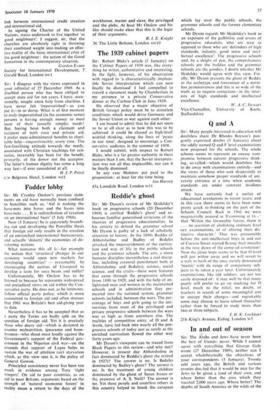Reddie's ghost
Sir: Mr Dyson's review of Mr Skidelsky's book on progressive schools (20 December 1969) is entitled 'Reddie's ghost' and re- hearses familiar generalised criticisms of the theories of progressive educationalists. In his anxiety to defend the grammar school Mr Dyson is guilty of a lack of scholarly attention to history. In the 1890s Reddie of Abbotsholme and Badley of Bedales attacked the impoverishment of the curricu- lum and way of life in the public schools and the grammar schools. The arts, a more humane discipline (nevertheless a real discip- line, including corporal punishment both at Abbotsholme and Bedales), science, social science, and the crafts—these were features that came through the progressive schools from 1890 to 1920, and with the help of en- lightened men and women in the maintained schools and in administration they per- meated into the national system, grammar schools included, between the wars. The per- centage of boys and girls going to the uni- versities from most of the privileged and private progressive schools between the wars was as high as from anywhere else. The realities of competitive entry, of 0 and A levels, have fed back into nearly all the pro- gressive schools of today just as surely as the enriched curriculum flowed the other way forty years ago.
Mr Dyson's viewpoint can be traced from Black Papers to this review—and why not? However, is present day Abbotsholme in fact dominated by Reddie's ghost (he retired in 1927)? The answer is no. Is Bedales dominated by Badley's ghost? The answer is no. Is the treatment of young children dominated by the ghost of Susan Isaacs or the presence of A. S. Neill? The answer is no. Yet these people and countless others in this country helped to break the carapace which lay over the public schools, the grammar schools and the former elementary schools.
Mr Dyson regards Mr Skidelsky's book as an exposure of the gullibility and errors of progressive educators, who are seen as opposed to those who are 'defenders of high standards, industry, good sense and intel- lectual excellence'. The progressive schools and, by a sleight of pen, the comprehensive schools are the baddies and the grammar schools are the goodies. I doubt whether Mr Skidelsky would agree with this view. Fin- ally, Mr Dyson presents the ghost of Reddie as the archetype and forerunner of a norm- less permissiveness and this is so wide of the truth as to require correction—in the inter- ests of high standards and intellectual excellence.
W. A. C. Stewart Vice-Chancellor, University of Keele, Staffordshire


































 Previous page
Previous page